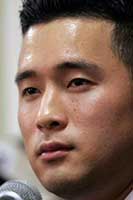Military resisters get civilian support
By
John Catalinotto
Published Jul 5, 2006 6:42 AM
The first commissioned officer to refuse
orders to take part in the occupation of Iraq was thanked by over a thousand
people at 30 different sites around the United States on June 27. First Lt.
Ehren Watada’s June 22 refusal to deploy to Iraq has inspired a wave of
support from anti-war forces, who are reaching out to dissident U.S. troops.
The demonstrations increased contact between the civilian anti-war
movement and the troops. More groups are offering support to GI resisters. In
polls, over 70 percent of U.S. troops in Iraq have said they want to get out.
The question remains whether Watada’s heroic example of individual refusal
can help awaken an impulse toward mass resistance within the occupation
army.
Watada had announced June 7 that he would refuse orders to go to
Iraq because the war there violates international and domestic law. He is
currently restricted to the large U.S. Army base in Fort Lewis,
Wash.
“I feel that we have been lied to and betrayed by this
administration,” Watada told the media in a telephone interview from Fort
Lewis. “It is the duty, the obligation of every soldier, and specifically
the officers, to evaluate the legality, the truth behind every
order—including the order to go to war.”
Reuters reported June
29 that five GIs are now being investigated for the premeditated rape of an
Iraqi woman, her murder and that of three other members of her family.
Considering that every day there is news about U.S. troops suspected of war
crimes like rape, murder and massacres of Iraqi civilians, it is easy to
understand the lieutenant’s revulsion.
|
Supporters of Lt. Ehren Watada
march in New York on June 27.
WW photo: John Catalinotto
|
As of now, the Pentagon has
only investigated blatant criminal actions by rank-and-file soldiers and
marines. No one has brought official charges against the high officers and
politicians who systematically lied to justify the illegal invasion and
occupation of Iraq.
Some of the June 27 demonstrations also expressed
solidarity with Spc. Suzanne Swift, another Fort Lewis soldier. Swift, after
spending a year in Iraq, went absent rather than deploy again on June 12. She
said she had faced sexual harassment from sergeants commanding her unit in Iraq
and was for ced into a sexual relationship with a sergeant who could order her
into battle.
Another military resister, Sgt. Kevin Benderman, is in the
prison in Ft. Lewis serving a 15-month sentence for his refusal to deploy to
Iraq last year. There are regular vigils outside the base in solidarity with
Benderman.
From Ft. Lewis
to New York City
Workers
World spoke to participants in some of the 30-plus demonstrations.
“Rallies and vigils were held in Seattle, Tacoma and Olympia, Wash.,
building up to the June 27 action, which brought 250 people to demonstrate and
rally outside the gate of Ft. Lewis,” said Jim McMahan. “People in
many automobiles honked their horns in support for the demonstration on a
freeway overpass on the six-lane highway and protesters spilled over right to
the gates of the fort.”
Speakers at the Ft. Lewis rally included
Ehren Watada’s mother, Carolyn Ho; his father, Robert Watada; and his
stepmother, Rosa Watada.
In Tacoma, the United Metho dist Church has
declared itself a sanctuary for soldiers not wanting to go to war. According to
Gerry Condon, a Vietnam-era military resister who was visiting the Ft. Lewis
area, the church “will provide counseling there, plus other resources that
sound like it will be kind of a ‘coffee house’”—the name
for gathering places that peace activists set up for GIs in towns near military
bases during the war against Vietnam.
In Charlotte, N.C., some 25 people
got together that same day, reports David Dixon. Organizers had shown the film
“Sir! No Sir!”—the suppressed story of the GI resistance
movement opposing the Vietnam War —at the public library in downtown
Charlotte. “Ahmad Daniels, a Black Vietnam-era military resister who is
mentioned in the film, gave an introduction and facilitated a discussion
afterwards. Daniels [known then as George Daniels—JC] spent two and half
years in prison for refusing to deploy to Vietnam while in the Marines,”
said Dixon.
“There was a rally in San Francisco at Justin Herman
Plaza,” Joan Marquardt reported, “with about 100-200 people. The big
banner read, ‘Thank you Lt. Ehren Watada—Refuse illegal war.’
Several of the speakers were veterans, mostly from the Vietnam era.”
In New York, college-age demonstrators argued with young soldiers outside
the Army Recruiting Office on Chambers Street. U.S. strategists talk about a
struggle for “hearts and minds” with regard to Iraqis. It is also
going on within the U.S. Armed Forces.
The protests around the country
appeared to be supported by a broad sector of the anti-war movement. Calls for
the actions came from Not In Our Name and the Campus Antiwar Net work and got a
lot of support from anti-war veterans’ groups like Vets for Peace. For
more information on the protests, see www.thankyoult.org.
Articles copyright 1995-2012 Workers World.
Verbatim copying and distribution of this entire article is permitted in any medium without royalty provided this notice is preserved.
Workers World, 55 W. 17 St., NY, NY 10011
Email:
[email protected]
Subscribe
[email protected]
Support independent news
DONATE


